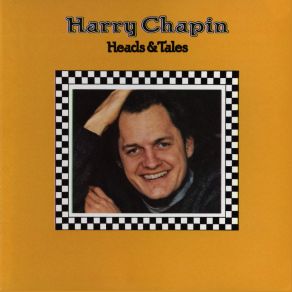Heads & Tales
Download links and information about Heads & Tales by Harry Chapin. This album was released in 1972 and it belongs to Rock, Pop, Songwriter/Lyricist, Contemporary Folk genres. It contains 9 tracks with total duration of 45:17 minutes.

|
|
|---|---|
| Artist: | Harry Chapin |
| Release date: | 1972 |
| Genre: | Rock, Pop, Songwriter/Lyricist, Contemporary Folk |
| Tracks: | 9 |
| Duration: | 45:17 |
| Buy it NOW at: | |
| Buy on iTunes $7.99 | |
| Buy on Amazon $3.99 | |
Tracks
[Edit]| No. | Title | Length |
|---|---|---|
| 1. | Could You Put Your Light On, Please | 4:28 |
| 2. | Greyhound | 5:40 |
| 3. | Everybody's Lonely | 4:07 |
| 4. | Sometime, Somewhere Wife | 4:54 |
| 5. | Empty | 2:55 |
| 6. | Taxi | 6:46 |
| 7. | Any Old Kind of Day | 4:47 |
| 8. | Dogtown | 7:28 |
| 9. | Same Sad Singer | 4:12 |
Details
[Edit]Harry Chapin's debut album is a smoothly put-together, if slightly musically unbalanced piece of singer/songwriter rock, unbalanced because good as everything here is, the hit, "Taxi," and the other songs on the original LP's second side somewhat overwhelm the rest of Heads & Tales. "Taxi" is so elaborately produced and arranged that it's like a feature film that clocks in at six minutes and 44 seconds; "Any Old Kind of Day" is a beautiful and unsettling confessional about an artist's unease and depression, like an East Coast equivalent to Brian Wilson's brand of personal songwriting, with a touch of James Taylor's influence and unique phrasings and sensibilities by Chapin; the epic "Dogtown" (which nearly overstays its welcome at seven and a half minutes) is a startling piece of song painting with a topical edge, which anticipated some aspects of Chapin's subsequent public commitment to progressive political causes; and "Same Sad Singer" is a haunting, romantic confessional that explores some of the same emotional territory in first-person terms that "Taxi" dealt with through characters. Side one's songs don't quite match up, though "Empty" has nice hooks and a good beat. The record holds up well in part because of its strange combination of lean production and rich sounds — producer Jac Holzman preserved all of the elements from Chapin's stage act that he liked, and apart from some keyboard embellishment from Steve Chapin and percussion by Russ Kunkel, it's all the basic quartet: Ron Palmer on electric guitar, Tim Scott on cello, John Wallace on bass, and Harry Chapin on acoustic guitar. They sound like a lot more players, and Palmer and Wallace add more than two backup singers should be capable of bringing to the table. Chapin's singing isn't actually that good, his range and expressiveness at times very narrow, but his energy and commitment to the songs pour off the album and make this album a compelling listen 30 years later.